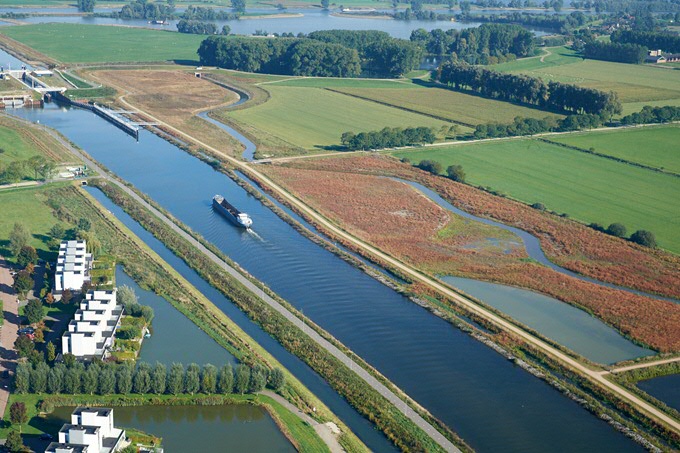New ways to redevelop valuable waterways

With some 6,200 kilometres of rivers, canals and lakes, the Dutch waterway network is one of the densest in the world. But as engineering structures such as locks, dams and bridges fall into disrepair, renovation of the waterways has become essential. New demands are also being made on the waterways; recreation, nature reserves, floating homes, irrigation and hydropower are all becoming increasingly important. PhD student Arjan Hijdra tried to find out how managers can cater to all the different needs and requirements in waterway renovations, and thus create maximum social value. Hijdra will be awarded a PhD by the University of Groningen on 16 February 2017.
Throughout history, rivers and canals have been adapted or built for the sole purpose of the shipping industry. When redeveloping waterways in the current climate, managers also want to increase their broader social value. This calls for far-reaching collaboration between the parties concerned, including waterway managers, provinces, municipalities and private parties. For his research, Hijdra analysed various waterway projects in the Netherlands and the United States of America, adapting transaction cost theory, a tried and tested method from the private sector, for use in the public infrastructural sector.
Transaction cost theory
Transaction cost theory assumes that every form of collaboration generates ‘transaction costs’: fuss, time, effort. ‘Until recently, we didn't pay much attention to the transaction costs in public projects’, says Hijdra, ‘but they have always been there. Although parties often recognize the benefits of collaboration, there usually turn out to be all kinds of obstacles that prevent them from working together. In terms of renovating a canal, for example, everyone agrees that you must also renovate the bike path running alongside it. This means that all the parties involved (the waterway management and the municipal department in charge of bike paths) must sign contracts and make agreements about funding etc.’
Comprehensive approach
‘In the long run, a comprehensive approach to renovating the waterways will pay off. The transaction costs for the parties must be carefully monitored as they often get in the way of integrality’, explains Hijdra. ‘Weighing up these costs means that every party gets the maximum benefit from the resources invested. It also helps to put a problematic situation into a broader context and encourages teams to identify and consider opportunities. However, if this causes too much ‘fuss’ (transaction costs), there is little chance of success. Conscious, structural reduction of these costs makes opportunities more viable and enables further, broader optimization.’
Miami River
So how can you reduce the transaction costs? Hijdra analysed various waterway projects, including the redevelopment of the Miami river. Hijdra: ‘In the 1990s, the Miami river was being polluted by derelict areas of Miami with disused port functions. The region wanted the economic interests of the river port (Miami Dade county) reinstated, the public wanted a clean river (task of the federal government) and project developers wanted to build new apartments on an attractive river. The interrelationships between problems, ambitions, financial interests and responsibilities made it almost impossible for each separate party to get the project off the ground, although they all recognized the enormous potential.’ ‘The project finally became a success when an independent, neutral platform was created, a sort of "interests broker’" This broker analysed the interests, alerted parties to opportunities and coordinated activities, reducing the demands made on the individual parties.’
Step-by-step plan
Hijdra’s findings have been compiled into a five-step plan for developing infrastructure with social value. Spin-offs from this research are already being implemented in the EU ‘Smart Governance of Infrastructure networks’ project.
Curriculum Vitae
Arjan Hijdra (Eindhoven, 1970) studied civil engineering at TU Delft. He conducted his PhD research in the Planning department of the Faculty of Spatial Sciences at the University of Groningen. Some of his research was carried out at Massachusetts Institute of Technology, USA. The Directorate-General for Public Works and Water Management co-funded the project. Spin-offs from this research are already being implemented in the EU ‘Smart Governance of Infrastructure networks’ project. Hijdra currently works as a senior advisor at the Directorate-General for Public Works and Water Management, specializing in the optimization of the general quality of the network. He is also a member of the advisory council to the World Economic Forum - Future of Construction Initiative and co-founder of the Global Infrastructure Institute, a platform focusing on knowledge for sustainable infrastructure.
More information
- Watch this short presentation on water innovation by Arjan Hijdra
| Last modified: | 28 September 2021 2.33 p.m. |
More news
-
24 March 2025
UG 28th in World's Most International Universities 2025 rankings
The University of Groningen has been ranked 28th in the World's Most International Universities 2025 by Times Higher Education. With this, the UG leaves behind institutions such as MIT and Harvard. The 28th place marks an increase of five places: in...
-
11 March 2025
East Groningen: universal basic services must be up to standard
Sjierdan Koster makes the case for long-term thinking and for bringing Groningen’s universal basic services up to standard.
-
05 March 2025
Women in Science
The UG celebrates International Women’s Day with a special photo series: Women in Science.
